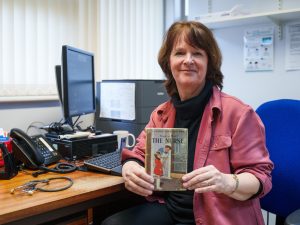Ruth, GP
I’m Ruth Eardley and I’m a doctor, I’m a GP at Market Harborough Medical Centre in Market Harborough.
Looking at the Ladybird books, do you think your job is like the one depicted in the book?
Main difference is that I’m a doctor not a nurse and growing up in the sixties, this book was published in 1963, I didn’t know that women could be doctors and I had a nurse’s uniform when I was about five and I had a plastic medical kit. But my mum had been a ward clerk at Leicester General Hospital and it was she that told me women could be doctors or nurses.
A similarity between me and the smiling nurses is that I have loved being a doctor and I think it’s an amazing privilege to get to know people and be able to help them.
What are the main differences between then and now?
Looking at the text it’s quite hierarchical. It actually says the doctors tell the nurses what to do and that’s never been my experience. As a medical student I was terrified of some of the ward sisters. Nowadays, we see ourselves as a team, we are a team. I’m a GP, a generalist, I ask advice from specialist nurses, say with asthma, diabetes or Parkinson’s disease, and they tell me what to do.
Another thing that’s changed with the book are the nurses’ uniforms. There’s no starched hats and aprons anymore. We have comfortable, washable, tumble-dryable scrubs. I’ve nearly always worn trousers for work. But even in the 1980s one elderly doctor asked me, was this ‘power-dressing’?
The other thing is that medical care has been revolutionised since this book was published 60 years ago. It does look wholesome and cosy, but people died then, they died of preventable diseases or because there was then no cure for their condition. Pharmacology, oncology (that’s treating cancer), emergency medicine – everything has come very far since then. I would say that medical care is a hundred times better.
And that 1960s nurse didn’t have a computer. The GP’s surgery here in Market Harborough didn’t have a computer either when I first started here in 1985, but the digital age has transformed healthcare.
What things have stayed the same?
In 1963 the NHS was fifteen years old, it was founded in 1948 and it is still a national treasure, isn’t it, despite its deficiencies? You still call an ambulance, it’s more modern than in the book, if there’s a bad accident. You still get a plaster on your leg if you break it, and still dedicated professionals who’ll look after you.
What makes your job special?
Well, it does feel useful. I’m a Christian and as a Christian I know that everyone has equal worth and that includes the disabled, the demented, the dying. Life can be very tough for people and it is great to bring relief and support even in terrible situations.I love problem solving and I love medicine and I love people. I would say that over the years my patients have sustained me. Sometimes an example of resilience and courage is quite inspiring and it gives me resilience and courage and their kindness, their advice have been hugely helpful.
Have you always worked in Harborough?
Well, funnily enough, my very first job was for the Ladybird Books factory in Loughborough! I was born in the south, but my family moved to Loughborough in 1966 and in the seventies I got a summer job at Ladybird and this supplemented my grant when I went to medical school, that was in 1979.
I have worked in a lot of local hospitals as well as part of GP training. I’ve done work in specialties like dermatology and eyes, ophthalmology; obstetrics and stuff like that. That was done at the Royal Infirmary, Leicester General, Kettering General and the old Groby Road Hospital, where I remember we were able to prescribe sherry or port to dying patients, you can’t do that now and it’s certainly not in the Ladybird book. I also did a job in Psychiatry at the old Carlton Hayes hospital in Enderby, which I loved and in general practice you get a bit of everything so that suits me fine.
What is special about doing your job in the Harborough area?
So much, but Harborough does have a very strong Christian heritage. And here at the surgery I see people who can’t be helped by a prescription. So, people have regrets about things that have happened in the past – they want to forgive themselves, they want to forgive other people, they want to be forgiven. And people are lonely and they want friends. People have what I call existential angst: Who am I? Where am I? What is it all about? And they want hope. And this is where the churches in Harborough help in so many ways because they are not stuck with ten minute appointments. They can address the spiritual aspects of life that we, as doctors, even the General Medical Council, recognise are as an important part of a consultation, but with us it gets lost in the business of dealing with everything else.
Do you have another connection with Ladybird books?
Yes. At middle school in Loughborough, that’s age 11-14, I had a fabulous art teacher called Kathie Layfield. She really was an amazing artist, she didn’t have much luck with me, I was rubbish at her subject, but she not only taught art, she had a second job illustrating Ladybird books.
Kathie and I were firm friends ‘til she died in 2022, but she was a great friend and a great advert for Ladybird. And of course, her original illustrations are now collectors’ items.
Ruth retired from General Practice in April 2024, she is much missed by patients and colleagues in Market Harborough.
